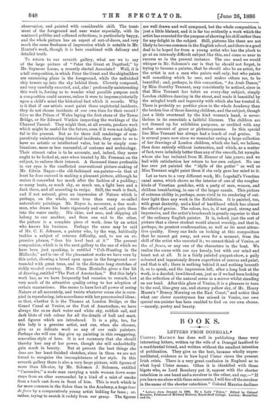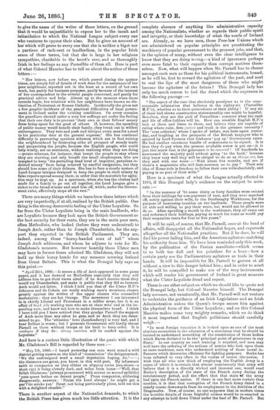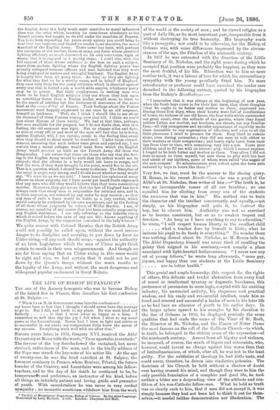BOOKS.
LETTERS FROM DONEGAL.*
COLONEL M.kuarcz has done well in publishing these very interesting letters, written by the wife of a Donegal landlord to- a confidential friend, and written without the smallest intention of publication. They give us the best, because wholly unpre- meditated, evidence as to how loyal Ulster views the present Irish crisis. There is a very'great confusion in England as to- what loyal Ulster means. Often it is identified with those bigots who, as Lord Rosebery put it, appear with the shorter catechism in one hand and a revolver in the other, and say,—" If you leave me alone with these miscreants, I will fire off the revolver in the name of the shorter catechism." Colonel Maurice declines * Letters from Donegal in MC By a Lady "Felon." Edited by Colonel Maurice, Professor of Military History, Royal Staff College. London : Macmillan and Co.
to give the name of the writer of these letters, on the ground that it would be unjustifiable to expose her to the insult and intimidation to which the National League subject every one who ventures to oppose their aims. But he gives an account of her which will prove to every one that she is neither a bigot nor a partisan of rack-rent or landlordism, in the popular Irish sense of these terms, but that she is large in her religious sympathies, charitable to the heart's core, and as thoroughly Irish in her feelings as any Parnellite of them all. Here is part of what Colonel Maurice has to tell us about the author of these letters :—
" Her letters, now before me, which passed during the quieter times, are simply full of details of work done for the assistance of her poor neighbours, reported not in the least as a record of her own work, but partly for business purposes, partly because of the interest of her correspondent in the several people concerned, and partly for practical advice and help. Almost up to the moment when these records begin, her relations with her neighbours have known no dis- tinction of Protestant or Roman Catholic. Incidentally she gives not a few graphic incidents of the practical difficulties of local govern- ment in Ireland under the existing conditions. On every occasion the guardians elected under a very low suffrage act under the feeling that their one duty is to prevent their own or their fellows' money from being spent for the good of others. If, however, the spending of public money would benefit their family, they break out in wildest extravagance. They vote and push and intrigue every man for a road to his particular door at the general expense.' She has continual difficulty in preventing specious schemes, which are in fact ruining the neighbourhood by destroying alike all prospect of steady trade and pauperising the people, because the English people, who could help wisely, act on sentiment, without realising what they are doing —potato schemes, for instance, that tempt the people to stay where they are starving, and only benefit the small shopkeepers, who are tempted to keep the prevailing dead level of impotent, penniless in- debted misery' from being relieved by needful emigration, lest they should lose some of their debtors. She has to face a steady system of Land-League intrigue designed to keep the people in their misery by false reports spread among them, in order that the materials for agita- tion may be kept up. As a specimen, when she has the clothes half made for a family to go out all together, the Land League give a ticket to the bread-winner and send him off, which, under the Govern- ment rules, effectively stops all the rest."
There are many things which we learn from these letters which are very imperfectly, if at all, realised by the British public. One thing is the strong democratic feeling of the Ulster Loyalists. So far from the Ulster Loyalists being in the main landlords, who are Loyalists because they look upon the British Government as the best security for their rents, they are in the main poor men, often Methodists, who looked (before they were undeceived) to Joseph Arch, rather than to Joseph Chamberlain, for the sup- port they expected in the British Parliament. They are, indeed, among those "horny-handed BOOB of toil" whom Joseph Arch addresses, and whom he adjures to vote for Mr. Gladstone's measure. But however heartily these Ulster men may have in former times admired Mr. Gladstone, they will not hold up their horny hands for any measure severing Ireland from Great Britain. This is what the Donegal lady says on this point :— " April 26th, 1886.—It seems a life of Arch appeared in some pious paper, and it has dawned on Methodists especially that they will address him to get their views aired : if he won't receive them they would try Chamberlain, and make it public that they did so because Arch would not listen. I think I told you that of the Ulster M.P.'s Johnston and de Cobain are really working men's members, chosen greatly against the wishes of the upper classes who counselled moderation : they are hot Orange. The movement I am interested in is chiefly Liberal and Protestant in a milder sense, but it is an affair of bond fide working men who are at their wits' end at the im- pending rain, and know not how to make themselves heard. I think I have told you I have noticed that they grudge Parnell the support of Arch more than any other he gets, and to Arch they are deter- mined to go. The 'situation' here (Londonderry) is very bad, and I hear Belfast is worse; but I presume Government will hardly thrust Parnell on them without troops at his back to keep order. It is madness if they do : strong coercion will be needed against the
Loyalists."
And here is a curious little illustration of the panic with which Mr. Gladstone's Bill is regarded by these men :—
" Hay 7th, 1886.-1 heard yesterday one man went round a wild district getting names on the kind of ' commission ' the delegates took. We the undersigned send a small deputation hoping, (tc.'—; the distances are great, you know; in this wild part. My informant saith to companion as they slither on slippery rocks (sea.shore—a short cut) it being already dark, and miles from home= Well, that fellah Gladstone' (always pronounced with accent on second syllable)
puts quare bother on decent people.' Pious companion, slithering dangerously, answers : Praise the Lord always ! he might get a parTtic stroke yet.' Peter, not being particularly pious, told me this with a delighted chuckle."
There is another aspect of the Nationalist demands, to which the British Press has given much too little attention. It is the
complete absence of anything like administrative capacity among the Nationalists, whether as regards their public spirit and integrity, or their knowledge of what the needs of Ireland are. Already, as we have seen, those Poor-law Unions which are administered on popular principles are prostituting the machinery of popular government to the grossest jobs, and that, in the opinion of many, without even the clear intelligence to know that they are doing wrong,—a kind of ignorance perhaps even more fatal to their capacity than corrupt motives them- selves. Now, what will happen when Mr. Parnell has to choose amongst such men as these for his political instruments, bound, as be will be, first to reward the agitators of the past, and next to seal the lips of the most dangerous of those who might become the agitators of the future ? This Donegal lady has only too much reason to feel the dread which she expresses in the following passage :—
"The aspect of the case that absolutely paralyses us is the unac- countable infatuation that believes in the eighty-six (Parnellite M.P.'s), whether as to their antecedents or their ability ! If any six of them had shown constructive statesmanship one might be hopeful. Recollect, they are the pick of Parnellites : conceive what the rank and file of office-holders will be. How can sensible English M.P.'s look at them and listen to them, and believe they are capable of ruling where calm, firm justice and truth is the greatest necessity ? The cess collector,' whom I spoke of before, was here again yester- day, and laughing at the prospects of the British taxpayer who is assured by Lord Spencer that Irishmen pay up' Government rates. He had another enormous bundle of summonses to be signed. It is true they do pay when the present available screw is put on—it is jest this screw that is the grievance to be removed ! Of hundreds he summoned the majority paid without going to the bank,' because they knew very well they will be obliged to do so as things are, but
they said with one voice Wait about five months, and see if there's a magistrate who will dare summon us to pay !' Their sole idea of Home-rule is freedom to follow their own wills absolutely, and paying is no part of their wills."
Here is a specimen of what the League actually effected in 1884, if this Donegal lady's evidence on the subject be accu- rate :—
" In the summer of '84 some thirty or forty families were evicted from their holdings for non-payment of rent, and they were marched off, sorely against their wills, to the Dunfanaghy Workhouse, for the purpose of increasing taxation on the landlords. These people were all able and willing to pay their rents, but would not be allowed to do so. After spending a month in the workhouse, they all came out and redeemed their holdings, paying as much for costs as would pay their respective rents for four or five years."
It will be said, of course, that Mr. Parnell, once at the head of affairs, will disappoint all the Nationalist hopes, and supersede altogether all the Nationalist practices. But if he does, he will find his power failing him, and the American agitators snatching his authority from him. We have been reminded only this week, by the publication of the Fenian manifesto—which seems to us both too dull and too pointless for a hoax—bow a certain party use the Parliamentary agitators as tools in their bands. It will be impossible for Mr. Parnell to govern at all without a view to this danger behind him ; and in order to avert it, he will be compelled to make use of the very instruments which will render his government of Ireland in great measure what the Ulster Loyalists dread and expect.
There is one other subject on which we should like to quote not the Donegal lady, but Colonel Maurice himself. The Donegal lady assumes, not unnaturally, that Mr. Parnell will not venture to undertake the guidance of an Irish Legislature and an Irish Administration unless the Queen's troops secure him against the physical force of the Ulster Loyalists ; and on this Colonel Maurice makes some very weighty remarks, which we do think it most important that English politicians should carefully weigh :— " In most foreign countries it is looked upon as one of the most absolute necessities in the education of a statesman that be should be trained to understand something of the constitution of those bodies which Bacon declared to be the principal point of greatnesse in any State.' In our country no such training is required, and men may well have the ordering of the actions of armies who look upon them as mere machines, men who understand nothing of those moral in- fluences which determine efficiency for fighting purposes. Burke has been referred to very often in the course of recent discussion. I wish that all who now think of employing the English Army in a cause of which it is certain that almost unanimously that army will believe that it is a directly wicked and immoral one, would read Barke's description of the state of the French Army during the revolutionary period, and the effect that that state of the army had upon the French nation. If there is one fact more certain than another, it is that that corruption of the French Army dated in a steady course downwards from its employment in the devilries of the Dragonades. Now, of course, no one supposes that in modern times the horrible details of those frightful crimes would be re-enacted in any attempt to hold down Ulster under the heel of Mr. Parnell. But the English Army is a body much more sensitive to moral influences than was the army which, trusting its conscience absolutely to the French priests, was taught to do evil under the mandate of Heaven. You have been expending for years every agency you could bring to bear that can improve, and therefore render more sensitive, the moral standard of the English Army. There never has been, with perhaps the exception of the modern German army, any force whose practical fighting efficiency so much depended on its own conviction, right or wrong, that it is engaged in a worthy cause. I could cite, with the fall support of those whose evidence is the best on such a subject, cases from modern fighting where the English fighting power has actually collapsed because officers and men believed that they were being employed in useless and wrongful butchery. The English Army is happily free from all party taint. As long as they are fighting for what they feel to be a worthy cause, and in behalf of England, they care very little for the party criticism which is directed against every war that is forced upon a world-wide empire, whichever party may be in power. But their employment in making men who claim to be loyal English subjects obey one whom they look upon as something worse than a Fenian leader, would seem to them to be the result of nothing but the intrigues of statesmen of the same kind as the coups d'etat of France. Their feelings about the Fenian movement were happily expressed to me once by an old sergeant, himself an Irishman. Well, sir, I think I should like to see about tin thousand of them Fenians coming over that hill. I think we could just about dispose of them nicely.' We had at that time, perhaps, BOO men available for the purpose, but I do not doubt that, with that feeling, the old sergeant was right. But to change sides and fight, as almost every officer and most of the men will feel that he is doing, against England, will, I am certain, result in the feeling that every man they should so shoot would be murdered. Under those circum- stances, assuming that such orders were given and carried out, I am certain that a moral collapse would issue from which the English Army would recover as little as the French Army did from the Dragonades. I am aware that there are those who say that the feel- ing in the English Army would be such that the orders would not be obeyed ; that the officers in a body would ask leave to resign, and that the men, if they were brought to the point, would fire in the air. That is a question which I should be sorry to discuss. The discipline of the army is as yet very strong, and I do not know whether many might say, 'We must do as we are told.' I have heard the opinions of many officers on those subjects, but I have never yet heard doubt expressed that any men who did obey would believe that they were committing murder. Moreover, they are aware that the law of England has been always such that every man is responsible for criminal acts, and is, in their execution, not covered by any order he may receive ; so that any man of such a force would be liable to a jury verdict, which would entirely be confirmed by his own conscience, and by the feeling of all those whose judgment he values, of Wilful Murder. I am, of course, not speaking of any course that has been actually proposed by any English statesman. I am only referring to the horrible vision which is raised before the eyes of any one who knows anything of the English Army, by the suggestion contained in the lady's letter."
We quite concur with Colonel Maurice that the British Army could not possibly be called upon, without the most serious danger to its discipline and morality, to put down by force an Ulster rising,—if any such should occur,—against the authority of an Irish Legislature which the men of Ulster might think c3rtain to result in their own misgovernment. And though we are far from saying that an Ulster rising in this sense would be right and wise, we feel certain that it could not be put down by the Queen's troops without the worst results to the loyalty of the Army, and without the most dangerous and widespread popular excitement in Great Britain.




































 Previous page
Previous page